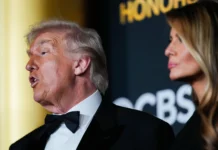
U.S. President Donald Trump on Wednesday rolled out a flurry of new tariff measures, targeting imports from Brazil, South Korea, and India, as well as announcing a 50% tariff on copper pipes and wiring, in a sweeping move aimed at reshaping global trade just ahead of an August 1 deadline for higher duties.
The latest wave of tariffs also includes the termination of the longstanding de minimis exemption, which had allowed low-value overseas shipments to enter the U.S. without tariffs. Ending the exemption is expected to significantly affect small e-commerce imports from China and other trading partners.
The announcements came in rapid succession throughout the day, beginning with a 25% tariff on Indian goods, imposed after months of failed negotiations between Washington and New Delhi. Trump accused India of stalling on a comprehensive trade agreement and said the new tariffs were necessary to protect U.S. industries.
Later in the day, Trump confirmed that a 50% tariff on copper pipes and wiring would take effect Friday. However, the measure stops short of broader restrictions, excluding copper ores, concentrates, and cathodes, a relief to some manufacturers who rely on imported raw materials.
According to Politico, the White House plans to unveil additional executive orders Thursday imposing elevated tariffs on countries that have yet to reach trade agreements with the United States. Brazil and South Korea are reportedly among those affected, though details remain limited.
Trump’s administration has aggressively pursued bilateral trade deals, and the tariffs are widely seen as leverage in ongoing negotiations. “The president is making it clear that countries that fail to meet fair trade expectations will face consequences,” a senior White House official told Politico.
The moves mark an escalation in Trump’s broader strategy to realign U.S. trade relationships and bolster domestic manufacturing ahead of the 2026 midterm elections. Critics argue the tariffs could spark retaliation and drive up costs for American consumers and businesses.
Still, the White House insists the measures are necessary to reduce trade deficits and encourage fairer competition. Further tariff actions are expected in the coming days as the administration finalizes its list of targeted countries.
Written By Rodney Mbua


















